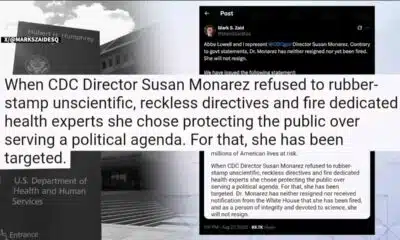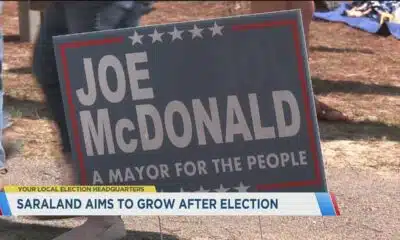News from the South - Texas News Feed
Texas House OKs bill banning land sales to foreign entities
Texas House advances bill that would prohibit land sales to people and entities from certain countries
“Texas House advances bill that would prohibit land sales to people and entities from certain countries” was first published by The Texas Tribune, a nonprofit, nonpartisan media organization that informs Texans — and engages with them — about public policy, politics, government and statewide issues.
Sign up for The Brief, The Texas Tribune’s daily newsletter that keeps readers up to speed on the most essential Texas news.
The Texas House agreed late Thursday to let the governor determine the countries whose residents, governments and other entities could be banned from buying property here.
Members granted the governor such power when they amended Senate Bill 17, whose real estate sales restrictions were limited to countries that the U.S. national director of intelligence has designated as national security threats. Currently, that list includes only China, Iran, North Korea and Russia.
After giving the governor the ability to expand the list of restricted countries, the House then gave SB 17 preliminary approval in a 85-60 vote. The bill now heads back to the Senate.
State Rep. Nate Schatzline, the Republican from Fort Worth who introduced the amendment, said the goal was to make sure that any threats to Texas could quickly be addressed.
“Our governor can act swiftly rather than waiting for a year for that to be added into the [director of national intelligence’s] designated country list,” he said.
That amendment drew rebuke from Democrats.
“This gives the governor unfettered power to add whatever county he wants to in this bill,” said state Rep. Gene Wu, chair of House Democratic Caucus. “It’s kind of dangerous to say one person can decide whatever country he or she wants to add to this without any oversight, without any controls — this is the definition of overreach.”
Schatzline’s amendment also allows the governor to bar people “transnational criminal organizations” to the list of entities barred from buying Texas property. Schatzline pointed to the Venezuelan gang Tren de Aragua as an example.
State Rep. Cole Hefner, the Mt. Pleasant Republican carrying SB 17 in the lower chamber, described the bill during Thursday’s hourslong debate as “securing Texas land and natural resources and making sure that this precious resource does not fall prey to adversarial nations and oppressive regimes that wish to do us harm.”
The bill’s advancement came over opposition from Democrats who are concerned that it could be used to potentially discriminate against Asian Americans.
The bill will need one more House vote before it goes back to the Senate. The upper chamber previously approved a version of the bill, but House members amended several key portions of it Thursday.
The Senate’s previous version would have exempted anyone or any entity that leased the property to someone else for under 100 years. The House limited that exemption to property leased to someone else for one year or less. Rep. Mitch Little called the 100-year lease exemption “a loophole that you could drive a Mack truck through.”
The House also previously amended the bill to exempt lawful permanent residents.
But Democrats failed to make changes to the bill several times Thursday. Their failed amendments included provisions that would have exempted visa holders such as medical students and researchers, performers and athletes. They also raised concerns that the law could hurt the Texas economy.
SB 17 is Brenham Republican Sen. Lois Kolkhorst’s second attempt at limiting who can buy property in Texas. Similar legislation she authored in 2023 died in the House. In committee hearings this year, she described the legislation as protecting Texas’ assets from “hostile nations.”
“This is a matter of national security,” she said in March. “Texas must act now to protect our land, food sources, water, and natural resources.”
A batch of new, more conservative lawmakers were elected to the House last year, giving new life to legislation that struggled in previous sessions. Chief among those measures are the creation of school vouchers.
If passed, the bill goes into effect Sept. 1 and would only apply to purchases or acquisitions after that date.
It would require the attorney general’s office to create a process to investigate possible violations and refer the matter to a district court. If the court finds a violation, it would be authorized to order the purchaser to divest from the property either by selling it or terminating the lease, according to the House Research Organization’s most recent analysis of the bill. The court also would be required to refer the matter for potential criminal offenses.
The amount of Texas property owned by entities from outside the U.S. is not tracked in detail, aside from agricultural land. But Joshua Blackman, a constitutional law professor at South Texas College of Law, said it is likely a very small fraction. In the U.S. overall, Chinese investors own less than 1% of total foreign-held acreage, according to 2021 data from the U.S. Department of Agriculture. Investors from Russia, Iran and North Korea collectively own less than 3,000 acres.
But to Abraham George, chair of the Texas Republican Party, 1% is too much — which is why the bill was a party priority.
Rep. Angie Chen Button, who was only the second Asian American woman to serve in the Legislature and whose parents fled from China, also spoke in support of the bill Thursday night, saying the bill aims to “protect our freedom, liberty and national security.” She introduced a similar bill last session.
Some Asian Texans are concerned the bill would create animosity and “state-sanctioned racial profiling,” said Lily Trieu, executive director of the civic engagement group Asian Texans for Justice.
The bill doesn’t prohibit purchases of land based on national origin, which would violate federal civil rights laws. Instead, it prohibits people based on their permanent residence.
Wu, who immigrated to the United States from China as a child, said the bill could impact not just Chinese people in Texas, but members of all Asian communities in the state.
“Nobody knows the difference between Chinese, Japanese, Vietnamese and Korean, right? Nobody knows what your immigration status is,” he said in an interview. “When they discriminate against you … when they look for people to assault, they don’t really care what you are. They care that you have Asian face.”
Trieu said the group’s No. 1 concern is that individuals shouldn’t be conflated with governments.
“Just like how no one here would want to travel to another country and be held individually accountable for what Governor Abbott does or what President Donald Trump does,” she said.
“These individuals should not be held accountable for what the government of their national origin does, or what their ideology is, or what, you know, the government does as an entity.”
Trieu said the group was formed to engage Asian Texans in civic participation such as voting, but this bill galvanized people into getting involved in legislation.
Wu expects the bill is just the start of that. And even with its passage, he sees it as a loss for the Republican Party because it could push Asian American voters to shift to the Democratic Party in the 2026 midterm elections.
“I think the Republicans are heading into gale force winds in 2026 if they want to alienate and make enemies of an entire community who for a large part has stayed out of politics,” he said in an interview.
First round of TribFest speakers announced! Pulitzer Prize-winning columnist Maureen Dowd; U.S. Rep. Tony Gonzales, R-San Antonio; Fort Worth Mayor Mattie Parker; U.S. Sen. Adam Schiff, D-California; and U.S. Rep. Jasmine Crockett, D-Dallas are taking the stage Nov. 13–15 in Austin. Get your tickets today!
This article originally appeared in The Texas Tribune at https://www.texastribune.org/2025/05/08/texas-foreign-land-purchase-senate-bill-17/.
The Texas Tribune is a member-supported, nonpartisan newsroom informing and engaging Texans on state politics and policy. Learn more at texastribune.org.
The post Texas House OKs bill banning land sales to foreign entities appeared first on feeds.texastribune.org
Note: The following A.I. based commentary is not part of the original article, reproduced above, but is offered in the hopes that it will promote greater media literacy and critical thinking, by making any potential bias more visible to the reader –Staff Editor.
Political Bias Rating: Center-Right
The article reports on a Texas legislative bill (SB 17) that grants the governor the power to restrict property purchases from certain countries, primarily citing national security concerns. While the article presents the various sides of the debate, including Democratic opposition to potential overreach and concerns about racial discrimination, the overall tone aligns more with the conservative viewpoint. The bill’s proponents emphasize protecting Texas’ resources from “hostile nations,” a frame often used in right-leaning discourse. Furthermore, the bill is championed by Republican lawmakers, with the concerns raised by Democrats highlighted but not fully supported, positioning the article toward a Center-Right perspective.
News from the South - Texas News Feed
Gunfire kills 2, injures 17 at Minneapolis school
SUMMARY: A gunman in his 20s opened fire outside the Annunciation Roman Catholic Church in Minneapolis during morning mass, targeting children attending the first week of school. Armed with a handgun, shotgun, and rifle, he fired multiple shots through the church windows, killing two children aged eight and ten and injuring 17 others, including 14 children, two critically. The shooter then took his own life. Minneapolis officials condemned the deliberate act of violence, expressing deep sorrow and urging community support for the grieving families. Police continue investigating the motive, noting the shooter had no criminal history or known connection to the church or school.
A gunman armed with three weapons opened fire on Catholic school students on Wednesday morning as they celebrated mass at Annunciation Church in Minneapolis, MN. Two children were killed and 17 others were injured. The gunman also died.
Subscribe to FOX 4: https://www.youtube.com/fox4news?sub_confirmation=1
Dallas news, weather, sports and traffic from KDFW FOX 4, serving Dallas-Fort Worth, North Texas and the state of Texas.
Download the FOX LOCAL app: fox4news.com/foxlocal
Watch FOX 4 Live: https://www.fox4news.com/live
Download the FOX 4 News App: https://www.fox4news.com/apps
Download the FOX 4 WAPP: https://www.fox4news.com/apps
Follow FOX 4 on Facebook: https://www.facebook.com/Fox4DFW/
Follow FOX 4 on Twitter: https://twitter.com/FOX4
Follow FOX 4 on Instagram: https://www.instagram.com/fox4news/
Subscribe to the FOX 4 newsletter: https://www.fox4news.com/newsletters
News from the South - Texas News Feed
Austin’s Mama Duke advances to AGT finals after getting Golden Buzzer
SUMMARY: Austin-based singer and rapper Mama Duke impressed judges and audiences on America’s Got Talent Season 20. During the live Quarterfinals, judge Mel B slammed the Golden Buzzer for Mama Duke’s original song “The Mama Duke Show,” sending her directly to the finale and bypassing semifinals. Mel B praised her talent, comparing her potential to Missy Elliott. Other judges, including Simon Cowell and Sofía Vergara, also lauded her authenticity and unique style. Mama Duke gained popularity after her audition song “Feels So Good To Be You” charted on iTunes. The finale will air on September 23, with viewers voting to decide the winner.
Read the full article
The post Austin's Mama Duke advances to AGT finals after getting Golden Buzzer appeared first on www.kxan.com
News from the South - Texas News Feed
West Texas Congressman’s ‘Big Beautiful’ Cuts Could Harm Rural Hospitals in His District
Since it was signed into law on July 4, West Texas Republican Congressman Jodey Arrington has been broadly praised by allies for his stewardship of the so-called One Big Beautiful Bill Act (OBBBA). U.S. House Speaker Mike Johnson called Arrington, who chairs the powerful House Budget Committee, “one of the most effective and consequential members of Congress.” And Arrington has wasted no time touting his victory in West Texas, proclaiming it to be a “game changer for Rural America” and “a big beautiful win for West Texas.” He’s argued the so-called entitlement cuts to Medicaid, the Affordable Care Act (ACA), and the Supplemental Nutrition Assistance Program will “root out waste and fraud.”
But many of his constituents in Congressional District 19—a vast, deeply red rural district that includes over 30 counties—stand to lose access to both their healthcare and their local hospitals under the massive tax-and-spending bill, which will slash Medicaid and ACA spending by more than $1 trillion and knock 10 million more people off of insurance nationwide over the next 10 years, according to Congressional Budget Office estimates. Arrington’s district is home to more rural hospitals than any other in Texas, and roughly a quarter of those are at risk of closing under the new law, according to a recent study. Six of the 25 hospitals in the 19th are at risk of closing, according to a June study by the Cecil G. Sheps Center for Health Services Research at the University of North Carolina. Using data from 2020 to 2022, the study defined at-risk rural hospitals as those with three consecutive years operating with a negative profit margin or those which receive a disproportionately large share of revenue from Medicaid.
Losses to rural hospitals from changes to Medicaid funding under the new law may be blunted by a $50 billion rural health fund that was added as a last-minute concession to rural members. The National Rural Health Association projected that the major hit Texas rural hospitals would take under the new law would shrink from an estimated loss of $1.2 billion to $407 million after the rural fund is applied over the next five years. But both the federal Centers for Medicare & Medicaid Services and state governments will have wide latitude on how to use the funding.
That’s left rural hospital administrators in Arrington’s district uncertain about the future of their facilities—and how the new law will affect them. Dennis Fleenor, the leader of the hospital in Muleshoe in Arrington’s district, has concerns. “By the time CMS and the state and everybody else get their fingers in that small slice of pie,” Fleenor said, rural hospitals like the one he runs may not get much money from the rural health fund.
Arrington did not respond to the Observer’s questions about the healthcare impact residents and hospitals in his district may face under the OBBBA. Arrington has served as the district’s representative since 2017 after a career that included working for a private healthcare company, for Texas Tech University, and as an aide for George W. Bush in the Texas Governor’s Office and the White House. Arrington has served as chairman of the House Budget Committee, one of the most influential positions in Congress, since 2023. He’s also served on the House’s Rural and Underserved Communities Health Task Force since 2019.
The 19th Congressional District hugs the New Mexico border on the west and crosses central West Texas past Abilene to the east. Anchored by Lubbock and Abilene, the district is largely rural, featuring 17 million acres of farmland that produce a fifth of the state’s total agricultural sales and more cotton than any other district in the country. It’s also mostly white and deeply conservative. Around 15 percent of the district’s residents are uninsured, according to 2023 census figures, which is nearly on par with the statewide rate—the highest in the nation. Many residents in Arrington’s district rely on public healthcare: 131,000 or 18 percent of the district population are enrolled in Medicaid. Statewide, 16 percent of residents are enrolled.
Ten percent of the district’s population is enrolled through the ACA marketplace, lower than the state’s 15-percent rate, according to a study by the health research and policy organization KFF. The tax-and-spending bill doesn’t extend ACA tax credits that expire at the end of the year and thus will cause insurance premiums to surge for the vast majority of current enrollees. KFF estimates the removal of the tax credits and added hurdles to enroll in the ACA could cause 1.7 million Texans to lose ACA coverage.
Because Texas never expanded Medicaid under the ACA, the state will not have to impose work requirements on Texas’ Medicaid patients or reduce its provider tax rate, which will be a requirement under the new law starting in 2027. However, the OBBBA did freeze the provider tax rates states use to finance Medicaid on July 4, making it more difficult for states to increase their own funding for the program.
Dr. Adrian Billings, a longtime West Texas community physician and associate dean of the Rural and Community Engagement Division at Lubbock’s Texas Tech Health Sciences Center, said that hospitals are required by law to provide emergency care to patients regardless of whether they can pay. But unlike urban hospitals that serve a higher volume of patients and can better afford to offset the costs of treating uninsured patients, increases in uninsured rates can quickly dig rural hospitals into bigger financial holes.
“It is harder for a rural hospital to absorb when somebody without insurance shows up in the emergency room or needs to be hospitalized,” Billings said. “There’s just not much fluff at all left in a rural hospital’s margins to suffer any significant hit to their collection.”
The Mitchell County Hospital District serves the county of nearly 9,000 in the southern area of Arrington’s district, situated between Big Spring and Sweetwater. CEO Michelle Gafford told the Observer that the county hospital projected to lose about $700,000 in Medicaid funding, or roughly 3 percent of its 2026 fiscal year budget. “The cuts are going to hurt everybody, but they are not as crucial as they once would have been,” Gafford said, since the hospital’s share of Medicaid patients has steadily transferred to privately run managed care organizations. In the 13 years Gafford has worked at the hospital, it’s made a profit in only one year. The hospital is designated as a critical-access hospital, which allows it to receive Medicare reimbursements at roughly the same amount of the cost of services. However, other insurers, particularly Medicare Advantage and other private insurers, routinely underpay or deny coverage for services, leaving rural hospitals like the Mitchell County Hospital District persistently in a financial hole.

More recent data gathered and analyzed by the Center for Healthcare Quality and Payment Reform shows that 11 rural hospitals in Arrington’s district now have had a negative total margin in the most recent three consecutive years with available data—representing over half of the 19 total such hospitals in the state. According to that data, three hospitals in the district have 20 percent or more of the hospital’s patient costs associated with Medicaid services. That includes the Muleshoe Area Medical Center.
Since the 1980s, the Muleshoe-area hospital, located in the sparse western Panhandle near the New Mexico border, has gone through its ups and downs as its owners changed from one group to another. According to the hospital’s website, after one national company bankrupted the hospital in 1987, a Muleshoe physician named Bruce Purdy kept it running by seeing patients, cleaning its bathrooms, repairing the facilities, and even sleeping in his clinic to attend to late-night emergencies. Dennis Fleenor, a Lubbock transplant, now runs the critical-access hospital on a shoestring budget. “It’s a struggle everyday. But we’re here to take care of our community, and we will take care of our community whatever challenges we face,” he told the Observer. But he said that Congress can go a long way to help rural hospitals by making insurers fully reimburse hospitals for patient service costs. Even though the hospital reported an average of 20 percent of the hospital’s patient service costs over the last two years were related to services for Medicaid patients, Medicaid paid the hospital for only 18 percent of those costs.
Between 2005 and 2025, 25 rural hospitals in Texas have closed, the most of any state, according to the center’s analysis. In CD-19, two rural hospitals closed during that time and at least six of the district’s 30 counties in the district already lack hospitals. In Jones County, north of Abilene, there once were three hospitals. In 2018, Stamford Memorial Hospital closed because it didn’t have enough in-patients. The following year, nearby Hamlin Memorial Hospital closed, leaving only its medical clinic and emergency medical services open. By 2023, Anson General Hospital was hanging by a thread with $1.9 million in outstanding debt. At that point, its board decided to convert the facility to a “rural emergency hospital.” That federal designation was established under a 2021 law that Arrington helped spearhead as a last resort for rural hospitals; in order to qualify for federal grants, those facilities must eliminate in-patient services. Texas now has five Rural Emergency Hospitals statewide; two, Anson General Hospital and Crosbyton Clinic Hospital, are in Arrington’s district.
Vance Boyd, an Anson-based cattleman, pro bull rider, and general contractor, told the Observer he remembers when Anson General Hospital was “thriving, productive, and employed a lot of people.” But he said it’s now “a triage center to get you to a bigger market.” As a cancer survivor, he travels roughly 24 miles to Abilene to see his doctor. “If you’re having a health emergency in a more remote area, you’re pretty much on a dice roll whether you’re going to make it,” Boyd said.
Gaines County, which borders New Mexico, was the epicenter of Texas’ recent measles outbreak. Since January, the outbreak led to 762 cases, 99 hospitalizations, and two deaths statewide, according to the Texas Health and Human Services. Eighty-one percent of the cases occurred in counties within Arrington’s district. Cash-strapped county hospitals with crumbling infrastructure in the surrounding area lacked the space to test for measles or beds to treat patients, the Texas Tribune reported.
Frustrated with the healthcare system, the “death spiral” of rural hospitals, and “AWOL” politicians, Boyd, a conservative Republican, ran against Arrington unsuccessfully in the 2020 and 2024 GOP primaries. His campaign centered, in part, around the need to expand Medicaid in Texas.
“When you live in an area where the average income is low and many are on some sort of government assistance, to expect everybody to have a premium healthcare plan is not realistic,” Boyd said. “I feel like our representative didn’t fight for us.”
Arrington, meanwhile, has his sights set on even further cuts to Medicaid. In mid-July, less than two weeks after he helped pass the OBBBA, Arrington told Bloomberg News that he would be seeking to pass deeper cuts to Medicaid, along with Medicare cuts that he had tried and failed to get locked into the Big Beautiful Bill. Among Arrington’s goals for a budget bill sequel this fall are to cut the federal reimbursement rate to penalize states that expanded Medicaid coverage under the ACA and reduce Medicare reimbursements to hospitals by paying the same rate regardless of the provider.
“I think we will do one before the end of the year,” Arrington told Bloomberg News. “It’s going to be a more targeted set of reforms.”
The post West Texas Congressman’s ‘Big Beautiful’ Cuts Could Harm Rural Hospitals in His District appeared first on www.texasobserver.org
Note: The following A.I. based commentary is not part of the original article, reproduced above, but is offered in the hopes that it will promote greater media literacy and critical thinking, by making any potential bias more visible to the reader –Staff Editor.
Political Bias Rating: Center-Left
This content presents a critical perspective on a Republican congressman’s budget bill, emphasizing the negative impacts of Medicaid and ACA cuts on rural hospitals and vulnerable populations. While it acknowledges the congressman’s achievements and conservative district context, the overall tone highlights concerns about healthcare access and funding reductions, reflecting a viewpoint more aligned with center-left critiques of conservative fiscal policies.
-
News from the South - Texas News Feed5 days ago
DEA agents uncover 'torture chamber,' buried drugs and bones at Kentucky home
-
News from the South - Virginia News Feed7 days ago
Erin: Tropical storm force winds 600 miles wide eases into Atlantic | North Carolina
-
News from the South - Missouri News Feed6 days ago
Missouri settles lawsuit over prison isolation policies for people with HIV
-
The Center Square6 days ago
Georgia ICE arrests up 367 percent from 2021, making for ‘safer streets, open jobs | Georgia
-
News from the South - Texas News Feed7 days ago
Texas House passes Hill Country relief effort | Texas
-
Local News6 days ago
Florida must stop expanding ‘Alligator Alcatraz’ immigration center, judge says
-
News from the South - Kentucky News Feed6 days ago
Quintissa Peake, ‘sickle cell warrior’ and champion for blood donation, dies at 44
-
Our Mississippi Home6 days ago
The Dixon: Writing a New Story for Main Street in Natchez










































